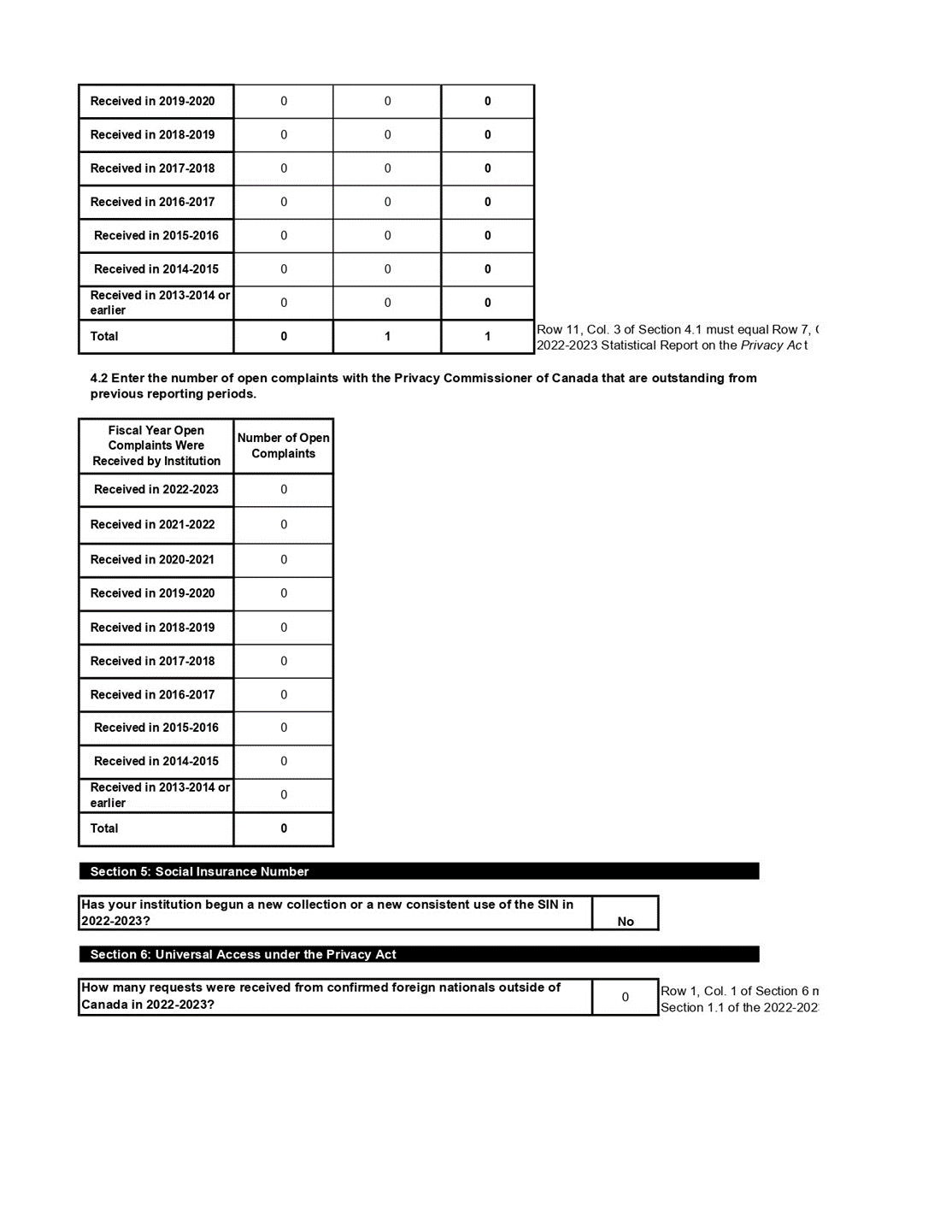INTRODUCTION
The Office of the Correctional Investigator is pleased to submit to Parliament its Annual Report on the administration of the Access to Information Act (ATIA) for the fiscal year commencing on April 1, 2022 and ending March 31, 2023. This report is submitted in accordance with section 94 of the Act. This report is tabled in Parliament by the Minister of Public Safety.
The Access to Information Act took effect on July 1, 1983. The ATIA gives Canadian citizens, permanent residents and any person and corporation present in Canada a right of access to information contained in government records, subject to certain specific and limited exceptions.
OUR MANDATE
The Office of the Correctional Investigator is mandated by Part III of the Corrections and Conditional Release Act as an Ombudsman for federal offenders. The primary function of the Office is to investigate and bring resolution to individual offender complaints. The Office also has a responsibility to review and make recommendations on the Correctional Service's policies and procedures to ensure that systemic areas of concern are identified and appropriately addressed.
OUR MISSION
As the ombudsman for federally sentenced offenders, the Office of the Correctional Investigator serves Canadians and contributes to safe, lawful and humane corrections through independent oversight of the Correctional Service of Canada by providing accessible, impartial and timely investigation of individual and systemic concerns. While an independent organization, the Office of the Correctional Investigator is part of the Public Safety Portfolio.
PROACTIVE DISCLOSURE ACTIVITIES
As a separate agency, the Office of the Correctional Investigator is listed in Schedule I.1 of the Financial Administration Act for the purpose of Part 2 of the ATIA.
The following table provides the list of proactive requirements to which the OCI is subjected, links to the publication platforms as well as the percentage of publications made within legislated timeframes over the reporting period:
Legislative Requirement | Section | Publication Timeline | Rate of Disclosure within Legislated Timeframes |
Travel Expenses (open.canada.ca) | 82 | Within 30 days after the end of the month of reimbursement | 100% |
Hospitality Expenses (open.canada.ca) | 83 | Within 30 days after the end of the month of reimbursement | 0% |
Reports tabled in Parliament (oci-bec.gc.ca) | 84 | Within 30 days after tabling | 100% |
Contracts over $10,000 (open.canada.ca) | 86 | Q1-3: Within 30 days after the quarter Q4: Within 60 days after the quarter | 100% |
Packages of briefing materials prepared for new or incoming deputy heads or equivalent (oci-bec.gc.ca) | 88(a) | Within 120 days after appointment | N/A |
Titles and reference numbers of memoranda prepared for a deputy head or equivalent, that is received by their office (open.canada.ca) | 88(b) | Within 30 days after the end of the month received | 100% |
Packages of briefing materials prepared for a deputy head or equivalent’s appearance before a committee of Parliament (oci-bec.gc.ca) | 88(c) | Within 120 days after appearance
| 100% |
Reclassification of positions (open.canada.ca) | 85 | Within 30 days after the quarter | N/A |
The Office is a micro agency with less than 40 FTEs. Senior management shares the responsibility to ensure that all proactive publication requirements are met. Proactive disclosure requirements has become a standard point on the Agenda of Senior Management Committee which occurs on a bi-weekly basis. All requirements are reviewed for any outstanding items and the responsible directors ensure follow-up as required. There were no training or awareness activities during the reporting period.
ACCESS TO INFORMATION ACTIVITIES
The Minister of Public Safety is the designated head of the institution for the Access to Information Act. The Correctional Investigator has been delegated full authority under the Access to Information Act by the Minister. Full authority under the Act has also been delegated to the Access to Information and Privacy Coordinator. The delegation of authority to administer the Act was confirmed by the Minister of Public Safety and Emergency Preparedness on July 31, 2020 (see Appendix C).
While the responsibilities of the ATIP Coordinator are assigned to the Director and Legal Counsel, the actual processing of requests and any associated activities are generally carried out by one (1) consultant. Given the limited number of requests, it is felt that this is the most cost-effective utilization of resources and delivery of these activities.
The ATIP Coordinator is accountable for the development, coordination and implementation of effective policies, guidelines, systems and procedures to ensure the responsibilities under the Access to Information Act are met and to enable appropriate processing and proper disclosure of information. The Coordinator is also responsible for related policies, systems and procedures emanating from the Act.
The main activities of the ATIP Coordinator include:
- Processing requests under the Act;
- Developing and maintaining policies, procedures and guidelines to ensure the Act is respected;
- Promoting awareness of the Act to ensure the OCI’s responsiveness to the obligations imposed on the government;
- Monitoring the OCI’s compliance with the Act, regulations and relevant procedures and policies;
- Preparing annual reports to Parliament and other statutory reports, as well as other material that may be required by central agencies;
- Representing the OCI in dealings with the Treasury Board Secretariat, the Information Commissioner and other government agencies regarding the application of the Act as they relate to the OCI; and
- Supporting the OCI in meeting its commitments in relation to greater openness and transparency through proactive disclosure of information and the disclosure of information through informal avenues.
The OCI is not subject to any agreements under section 96 of the Access to Information Act.
DURING THE REPORTING PERIOD
Twenty-five (25) requests were received and there were eight (8) outstanding from the previous reporting period. Of these requests:
Twenty-three (23) were disclosed in part (79%)
Two (2) were released in its entirety (6%)
None were exempted or excluded in their entirety
One (1) was abandoned (3%)
Two (2) had no existing records (6%)
One (1) was transferred (3%)
Four (4) were carried forward to the next reporting period (13%)
At the time of reporting, one (1) request was still outstanding from the 2020-2021 reporting period. Seven (7) requests were outstanding from the 2021-2022 reporting period and two (2) were completed within the legislated timeline and five (5) were completed beyond the legislated timeline.
During this reporting period we have received the majority of requests by way of email (44%). Due to the majority of our requesters being incarcerated individuals, receiving requests by mail (36%) or in person (4%) during institutional visits, is a close second.

Extensions were taken for five (5) of the requests. Extensions were taken to consult with other government departments. In order to alleviate extensive delays when consulting with the Correctional Service of Canada, the Office and CSC have come to an agreement that consultations will only be done when absolutely necessary.
There were two (2) informal requests received this year.
The Office could not meet the statutory response time for twenty-one (21) requests during the reporting period. In thirteen (13) of the twenty-one (21) requests, the delays were attributable to delays within our own office.
The OCI responded to 27% of requests within the legislated timelines. Completing requests within legislated timelines presented challenges over the reporting period, mostly due to a lack of human resources. The OCI is in the process of resolving this shortage within 2023-2024.
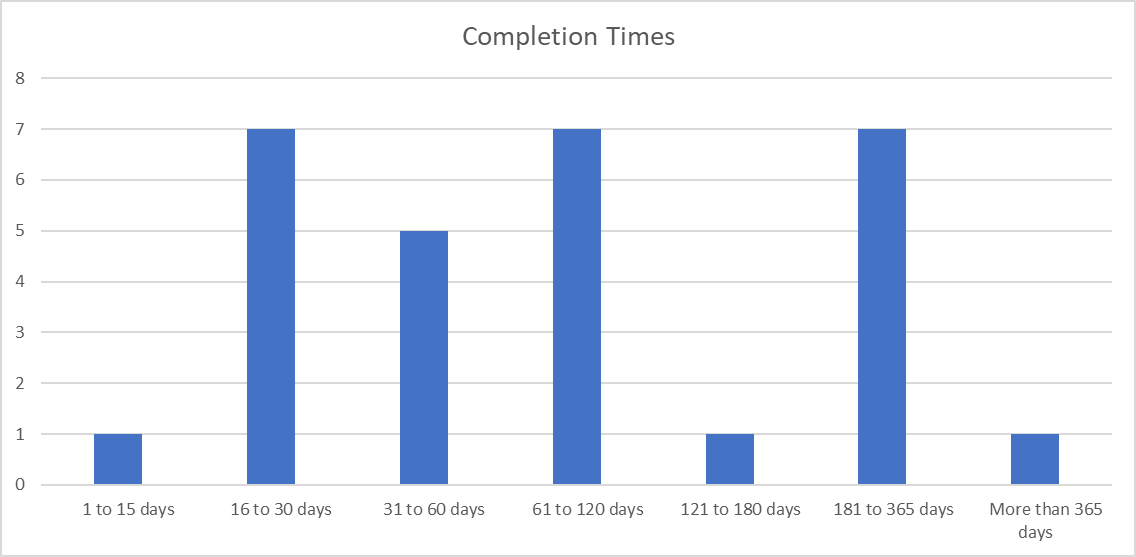
Monitoring of the time required to process these access requests was completed by the ATIP Coordinator in preparing the historical trend analysis in this report. The Executive Director and the ATIP Coordinator are advised by way of a briefing note when requests are not closed within the required time limits. The briefing note advises of the reason for the late response.
No training sessions were provided during the reporting period. Advice, guidance and recommendations were provided by the consultant on an as required basis to Management and staff.
The OCI did not receive any complaints during the reporting period.
COVID-19 RELATED MEASURES
While COVID-19 related measures have been phased out, the maintenance of hybrid work required some pragmatic adjustments over the reporting period as the majority of requesters are incarcerated and have no access to electronic communications.
INITIATIVES AND PROJECTS TO IMPROVE ACCESS TO INFORMATION
In alignment with the latest Treasury Board guidelines in Canada, our office has taken significant strides to enhance public access to government records. To facilitate this accessibility for inmates, we have implemented a policy to waive the $5 application fee for access to information requests. By removing this financial barrier, we aim to streamline the process and ensure that inmates can readily obtain the information they seek without undue burdens. Our commitment to promoting transparency and ease of access underscores our dedication to serving the public interest and fostering a more inclusive and responsive governance approach.
COSTS
For 2022-23, the costs directly associated with the administration of the Access to Information Act are estimated at $49,751.
Staff $20,208
Consultant fees $25,095
Other $ 4,448
The associated employee resources for 2022-2023 are estimated at 0.262 FTE for administering the Access to Information Act.
Staff shortages has required the direct involvement of members of the Senior Management team to ensure the day-to-day operations, which explains the relative higher costs associated with the administration of the Access to Information Act during the reporting period.
FIVE-YEAR HISTORICAL TREND ANALYSIS
Over a five-year period, from 2018-2019 to 2022-2023, the OCI received an average of twenty-four (24) requests annually.
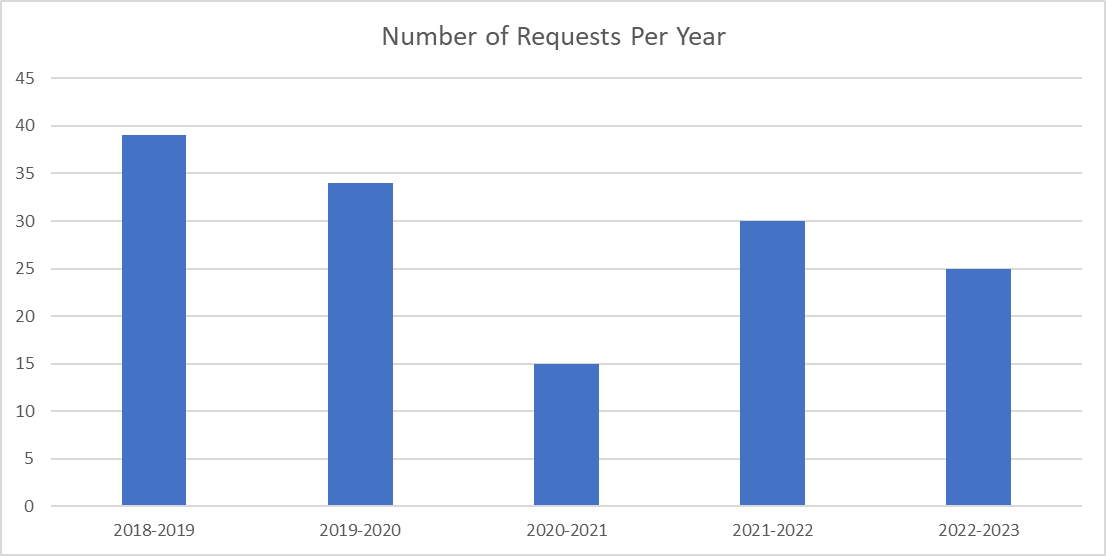
Over the last five years, the OCI has maintained a 32% completion rate of requests processed between 1-60 days.
The Source of the Requests remains the most often the Public with an average of seventeen (17) requests followed by Business and Media with an average of two (2) and two (2) requests respectively.
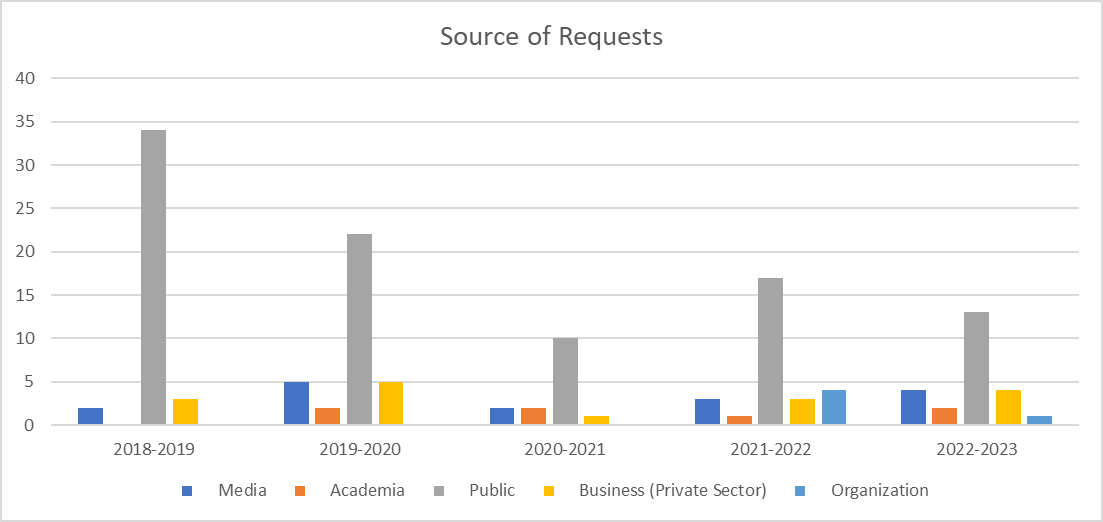
Concerning the number of pages processed, an average of seven thousand, three hundred and twenty-five (7,325) was recorded.
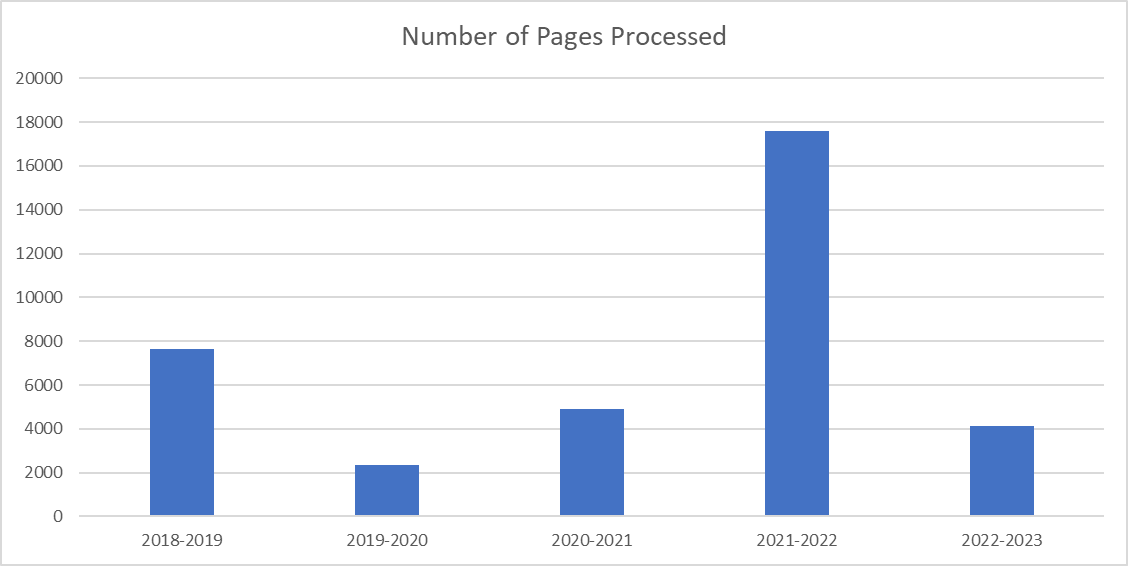
The most frequently used exemptions were:
- 19(1) at 50%
- 16(1)(d) at 18%
- 16(1)(c) at 9%
A total of forty-three (43) extensions for consultations were recorded for an average of nine (9) extensions per reporting period. Because the majority of the records held by the Office were provided by or of interest to the Correctional Service of Canada, the majority of our files require a consultation with the CSC ATIP office.
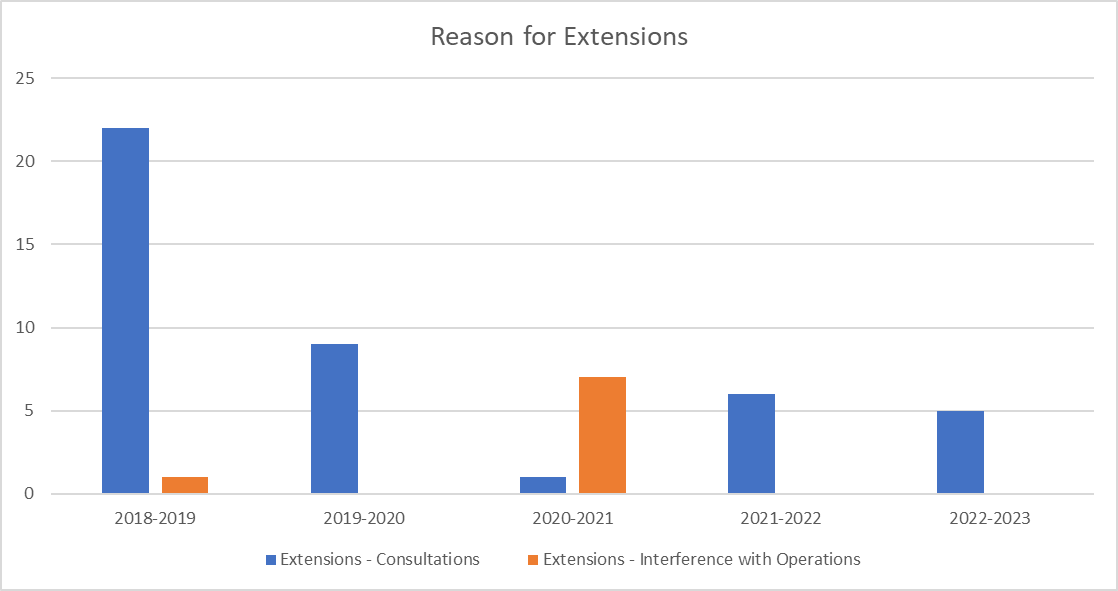
A total of twenty-six (26) consultations were received from other government organizations for an average of five (5) consultations per reporting period.
This baseline data will continue to be used in future years to assess trends, inform ongoing improvement in the processing of ATI requests and implementing corrective measures where necessary.
Appendix A: Delegation Order
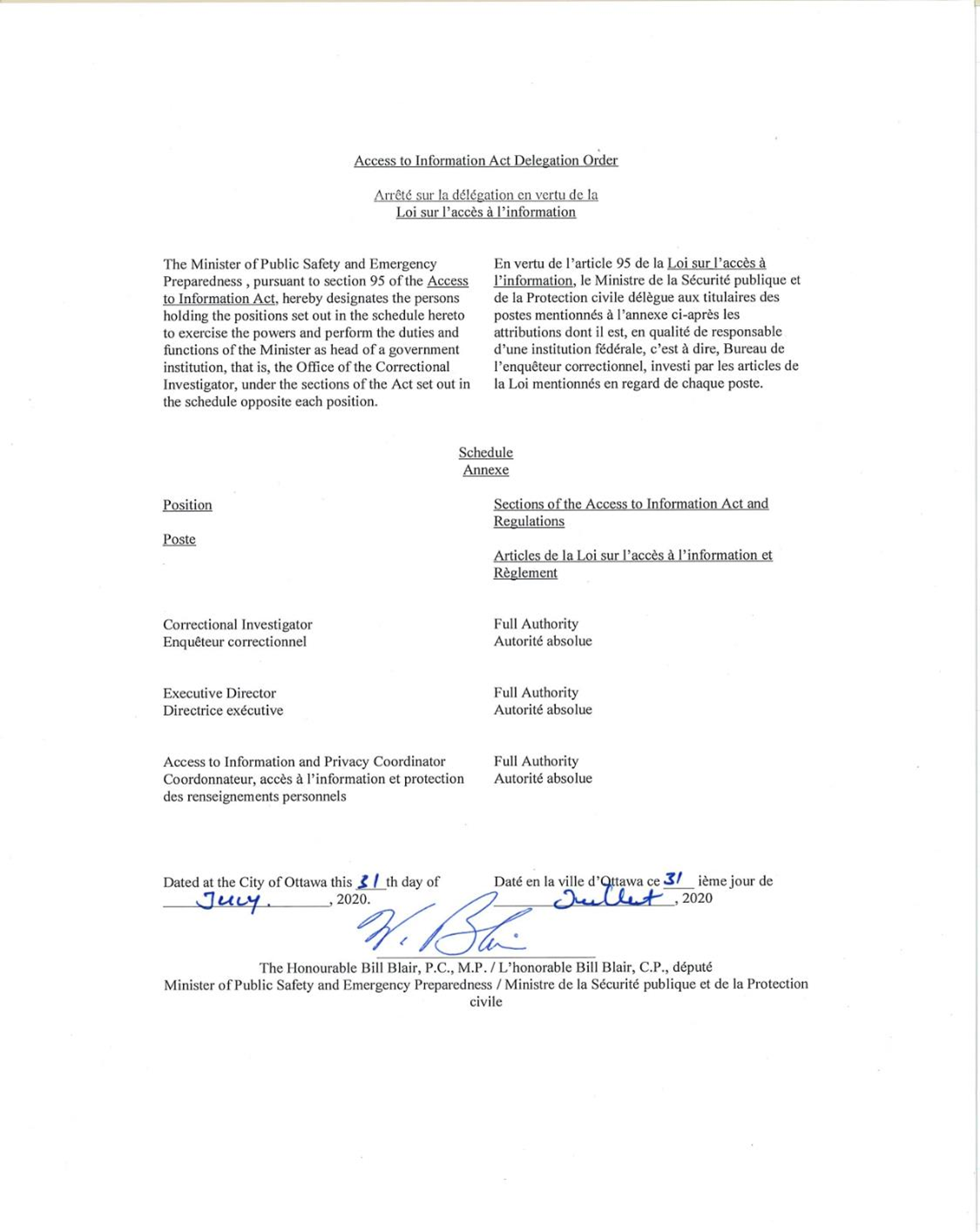
Appendix B: Statistical Report
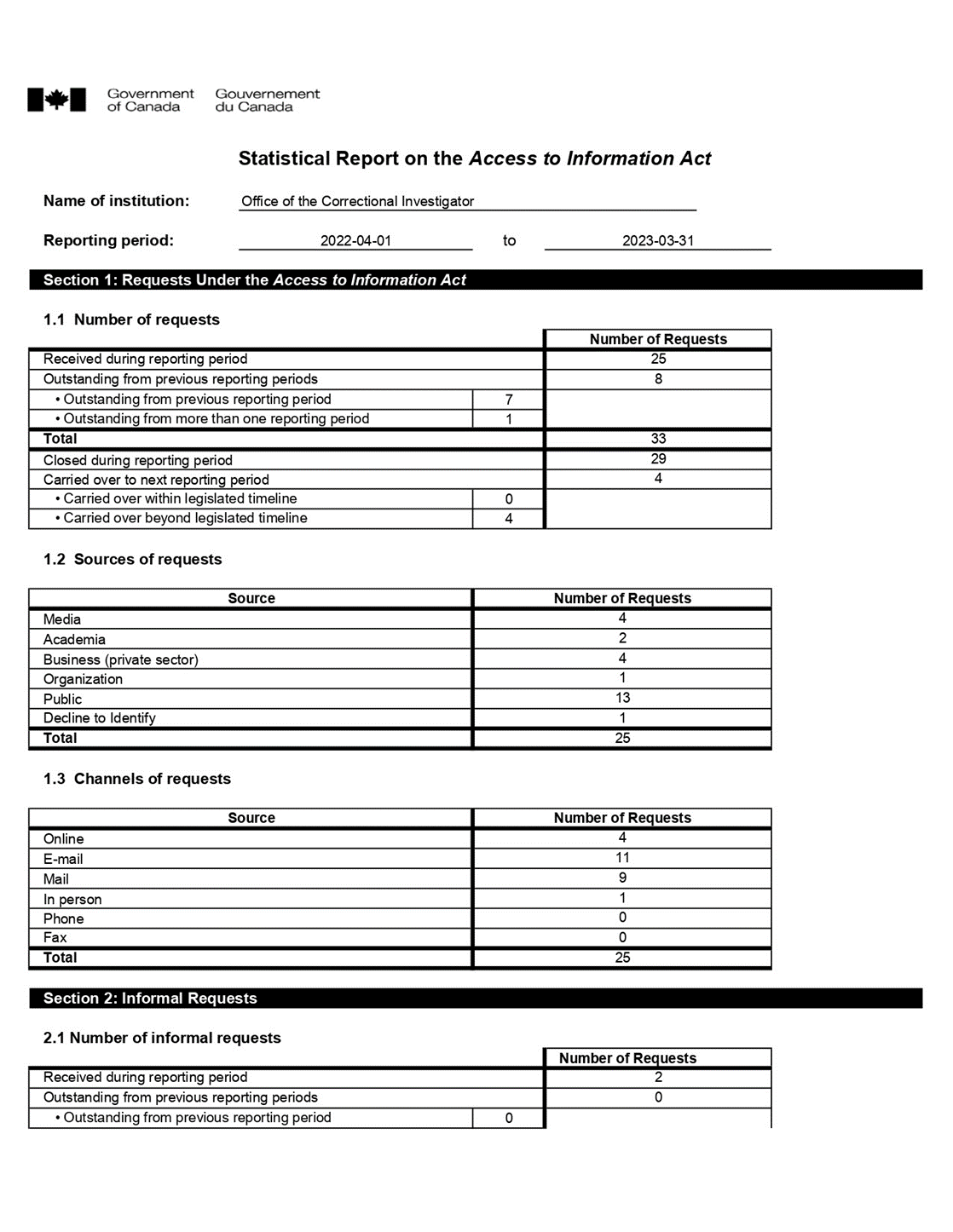
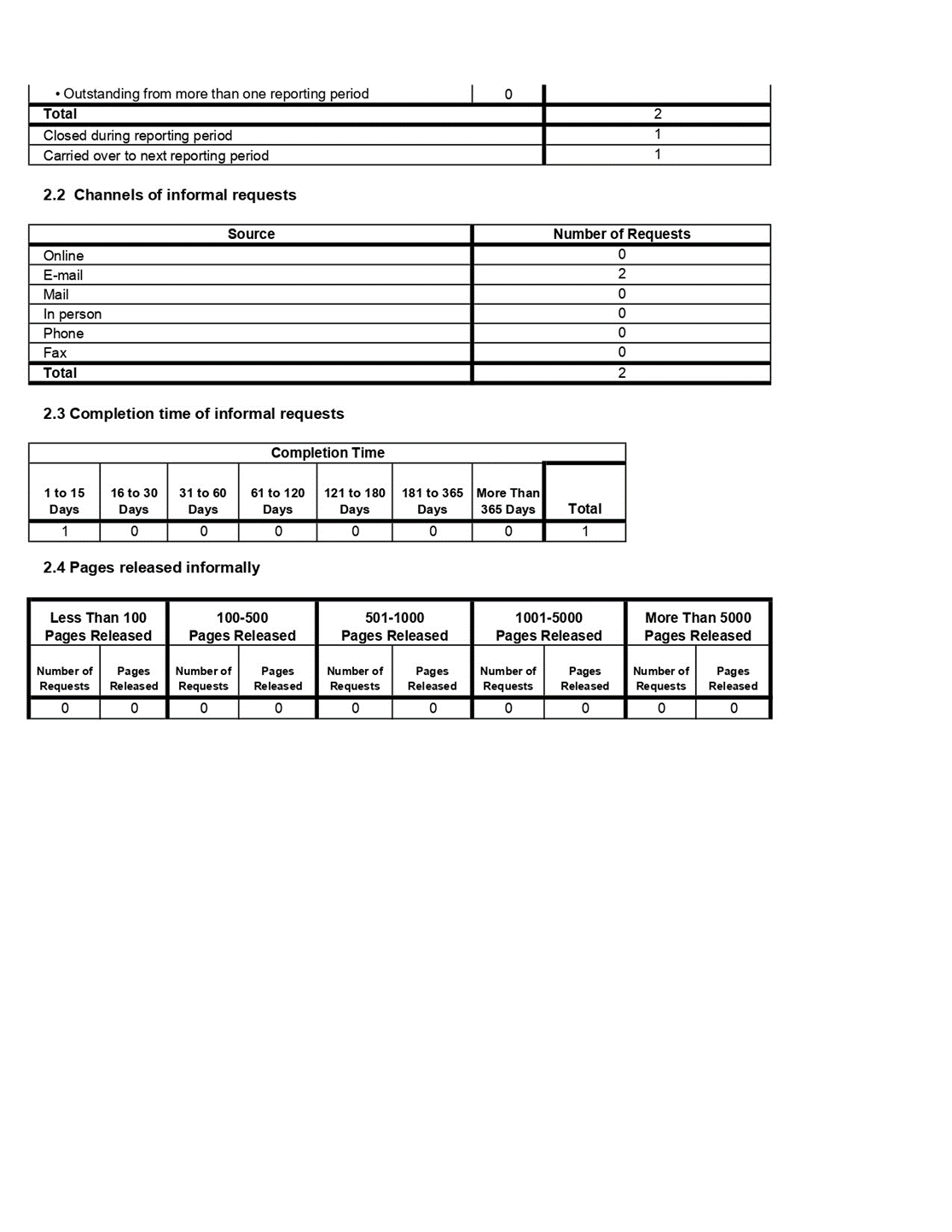
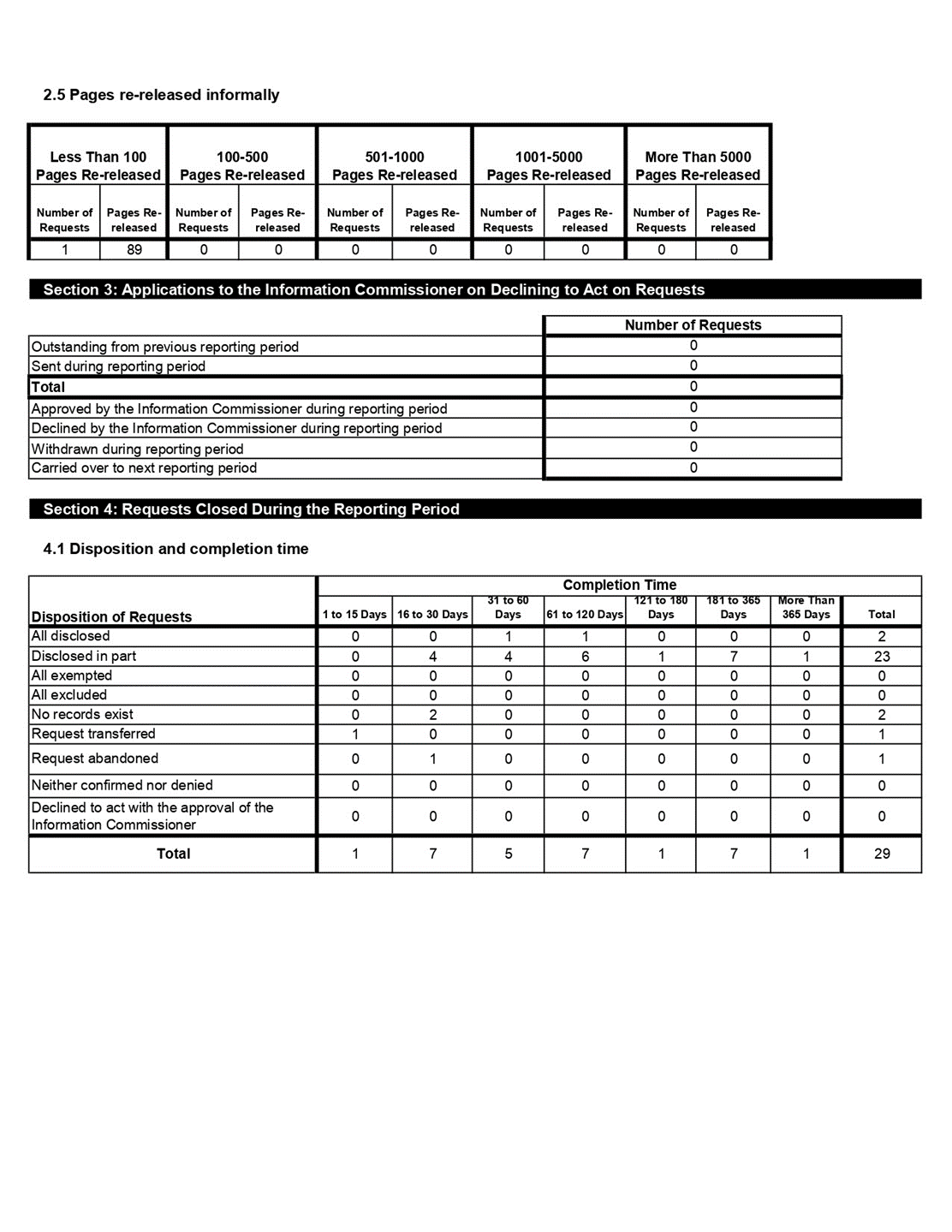
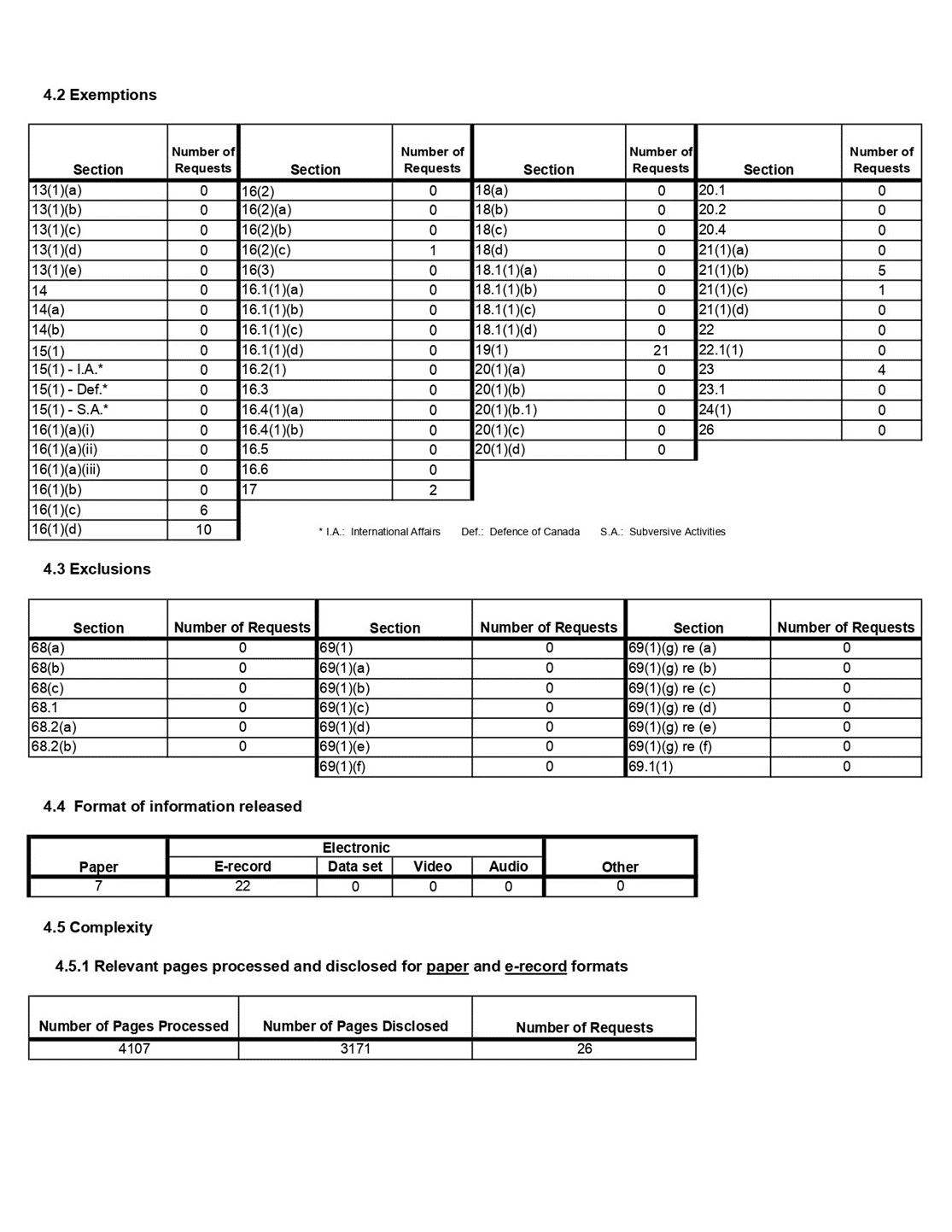
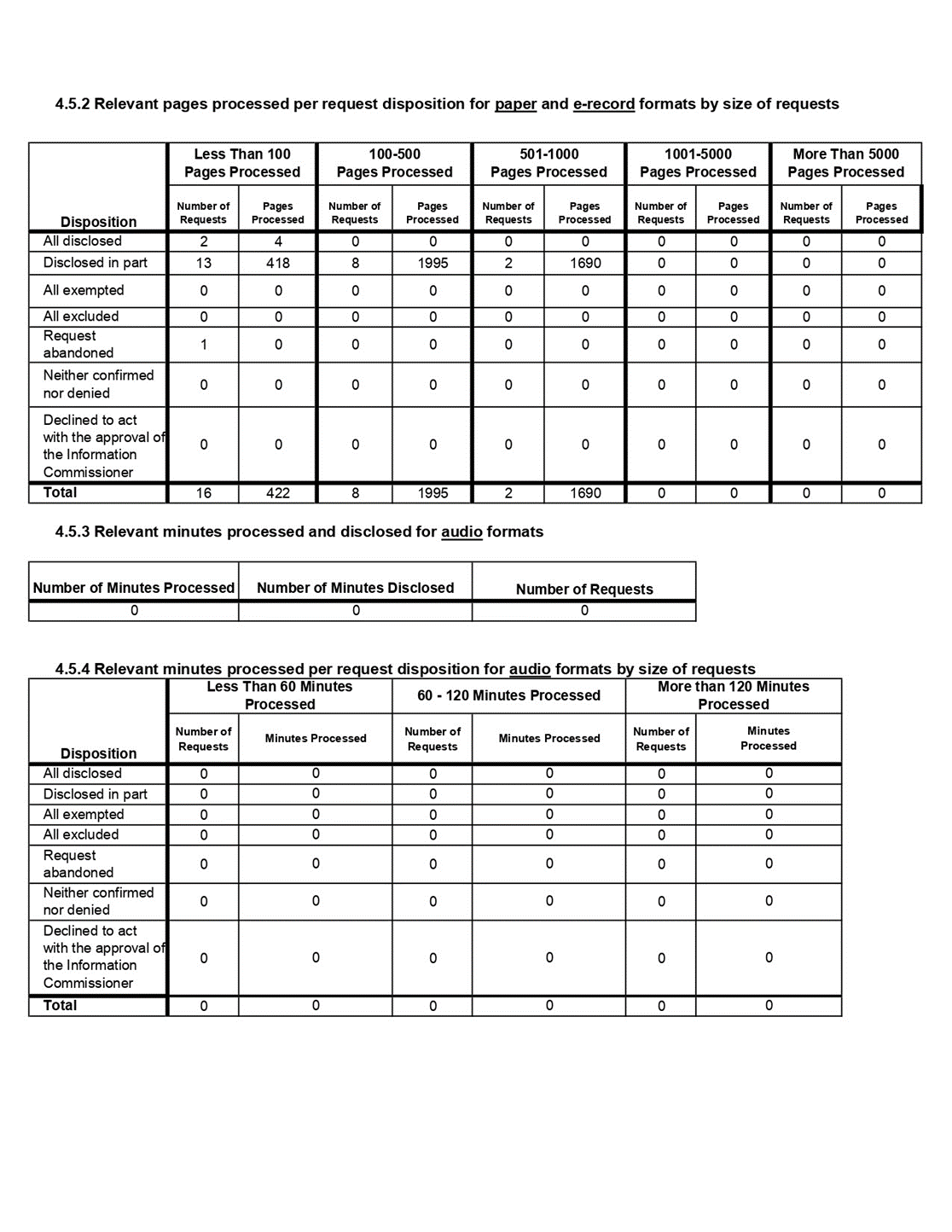
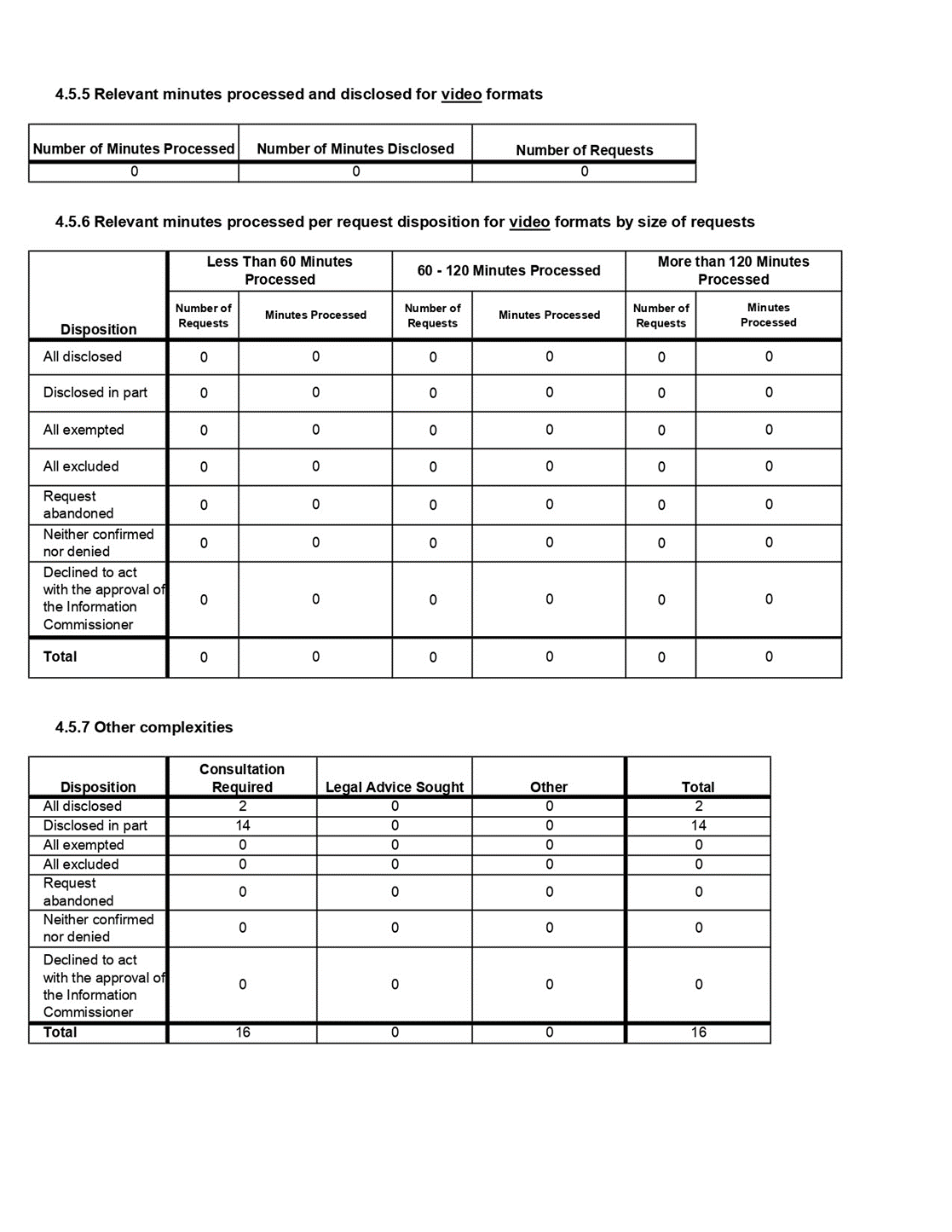
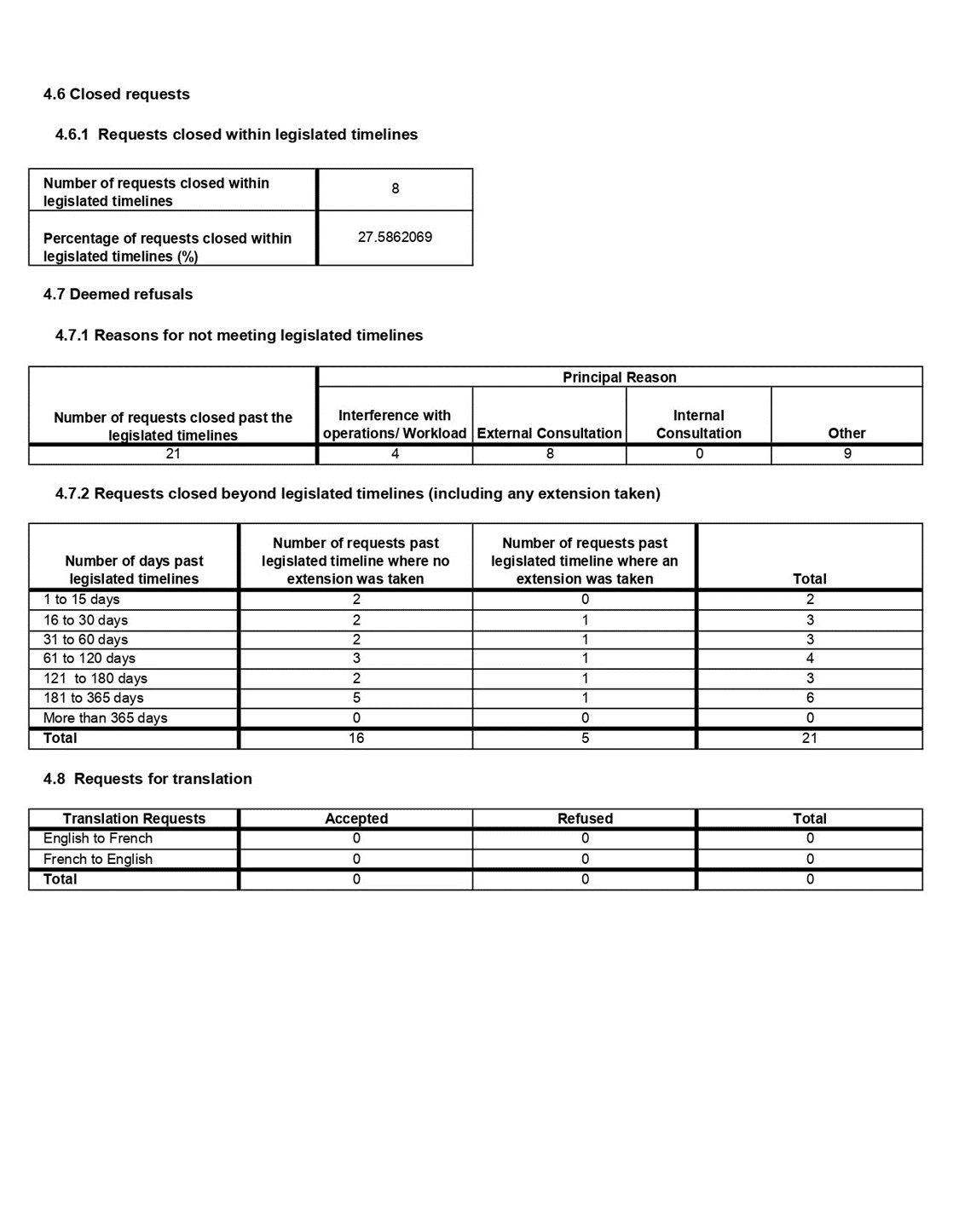
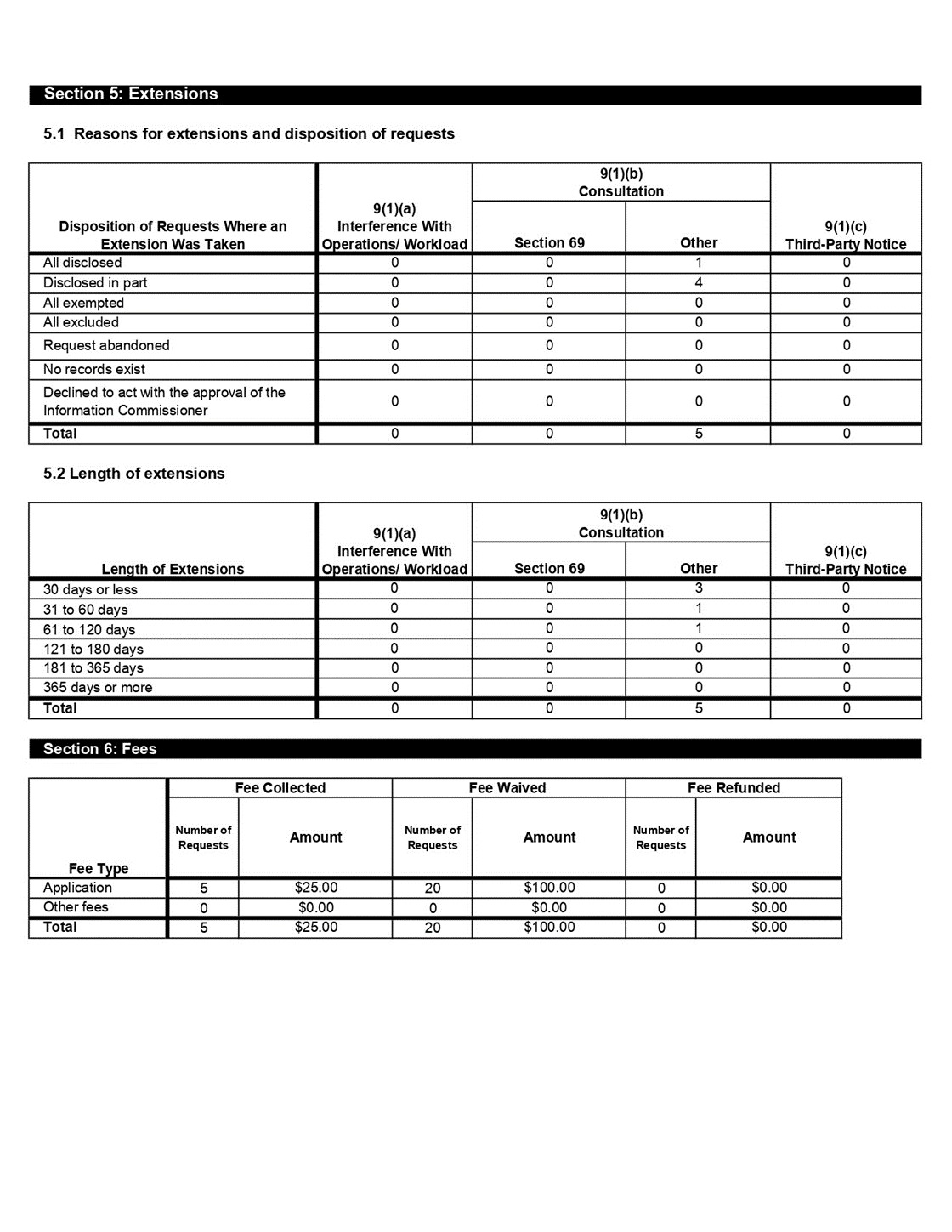
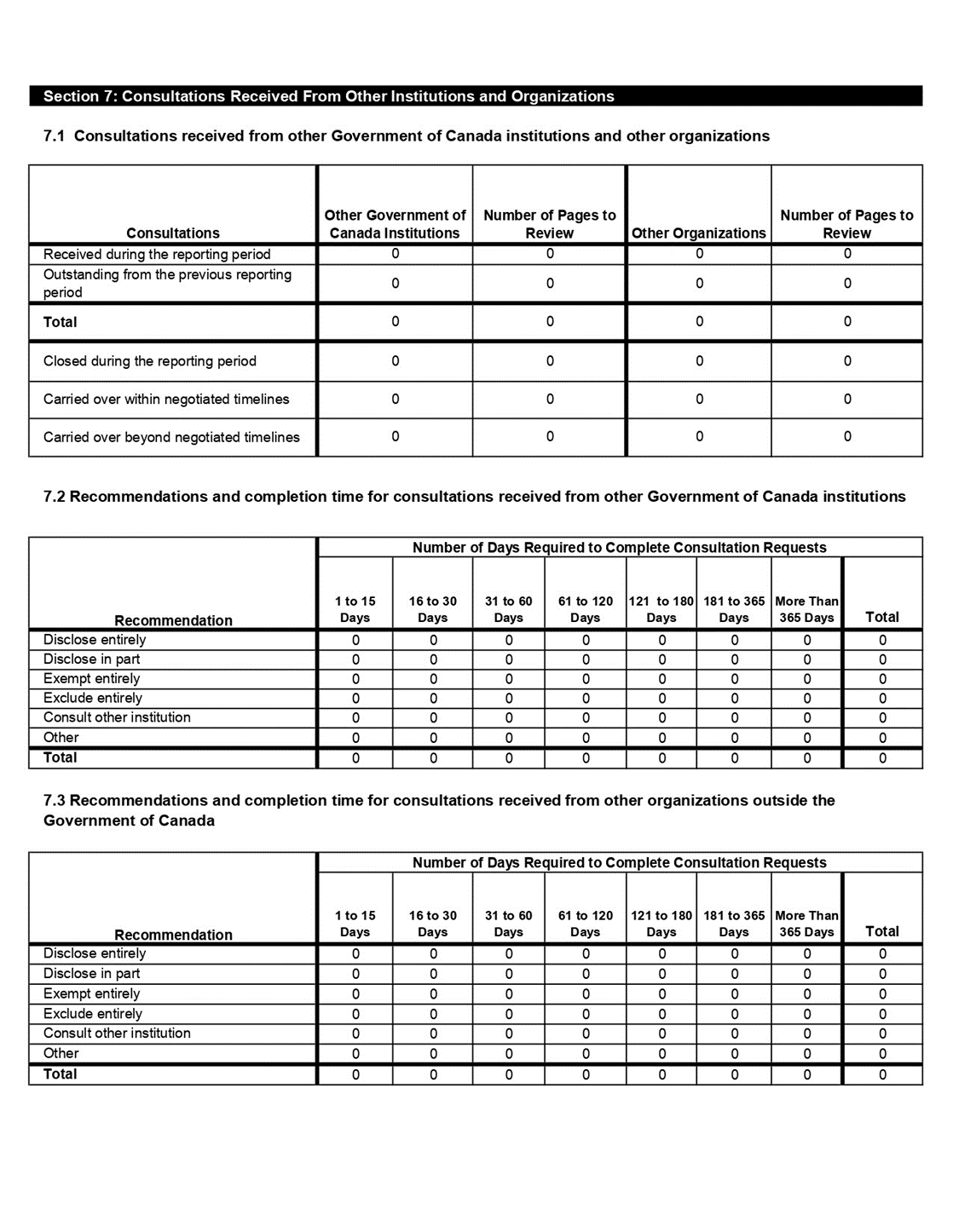
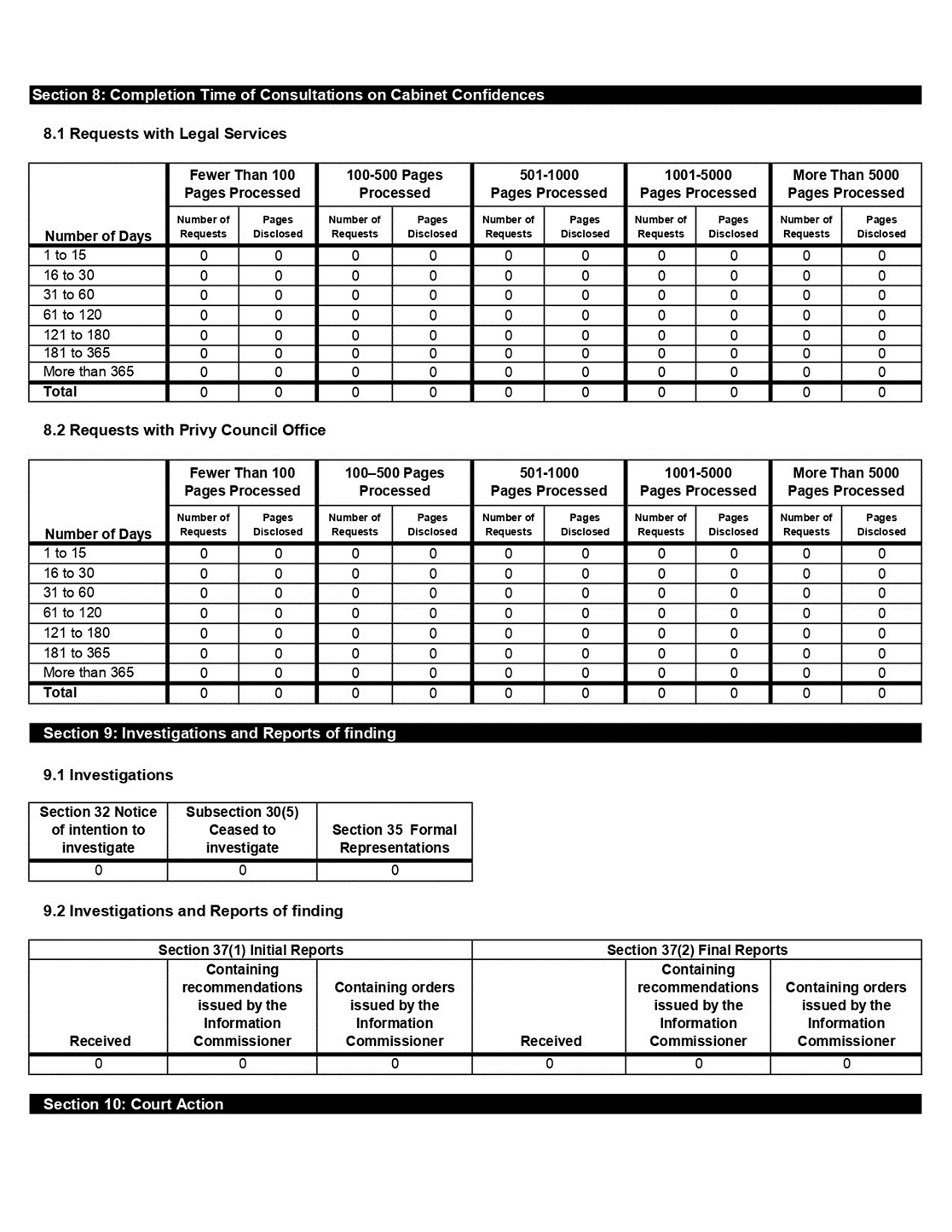
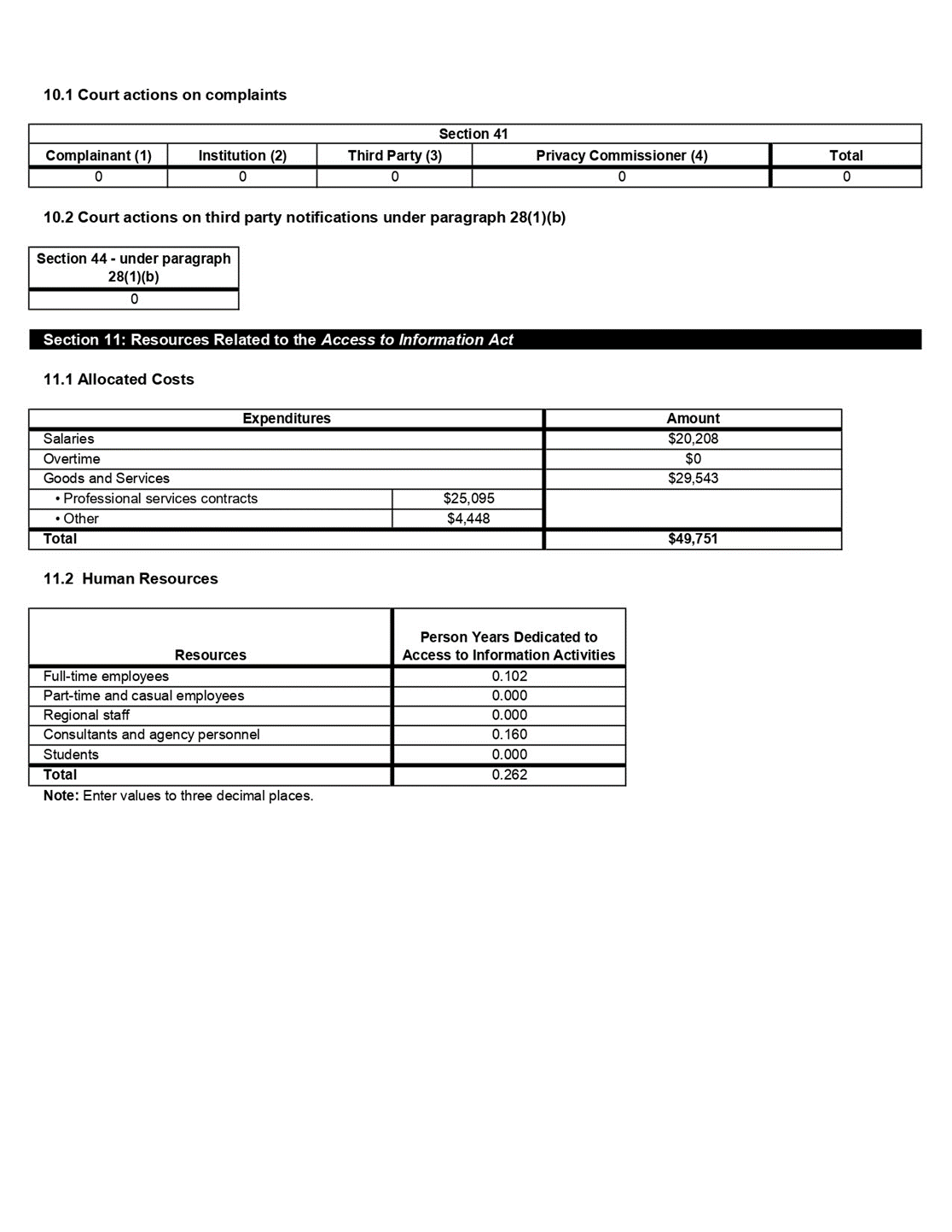
Appendix C: Supplemental Statistical Report
